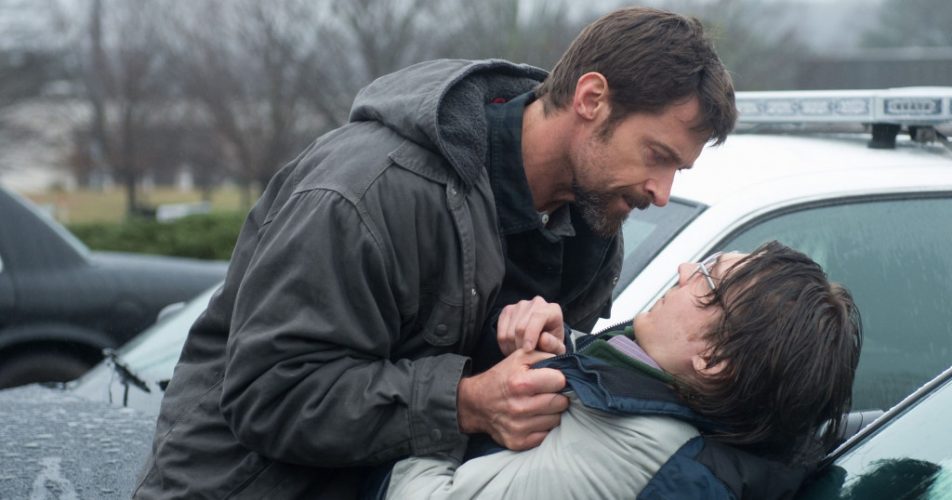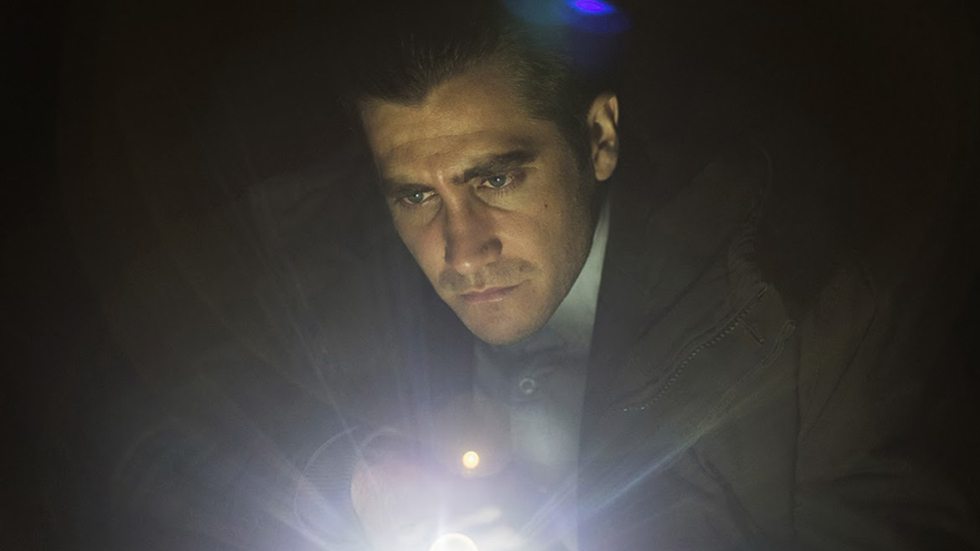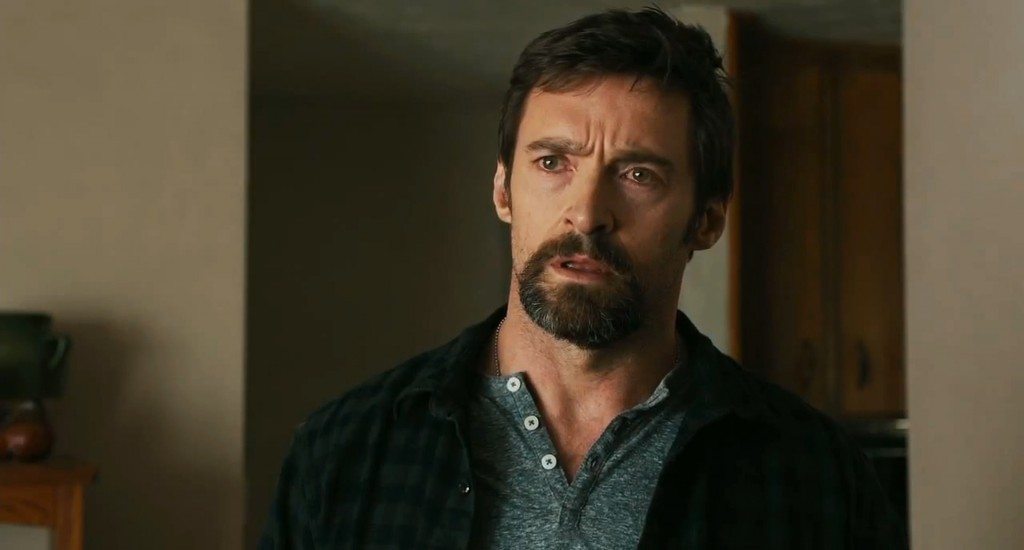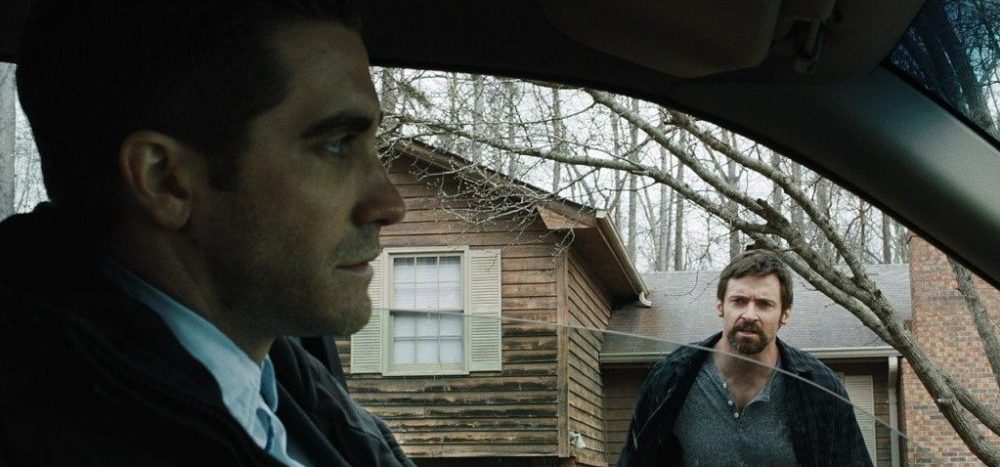‘Prisoners’ is an engrossing crime thriller directed by Denis Villeneuve. With his English language debut, Villeneuve created a story layered with suspense, thrill, and excitement. It is an experience that invites us to peel off the layers and try to make meaning from its moving images. Aided by Aaron Guzikowski’s script and Roger Deakin’s gloomy and bleak vision of Pennsylvania suburbs, ‘Prisoners’ takes us deep within the lives of its characters and their inner struggles.
A story about survival, perseverance, and faith, the film is a seamless thriller. Superlative performances by Hugh Jackman and Jake Gyllenhaal drive this thriller into cinematic brilliance. It revolves around Keller Dover (Jackman), a struggling contractor living a quaint life with his wife, Grace (Maria Bello), son Ralph (Dylan Minnette), and daughter Anna (Erin Gerasimovich). A devout Catholic, Keller is a survivalist by nature, evident from his stacked basement with enough provisions to last an apocalypse.
Their life is devastated when their daughter Anna goes missing. Detective Loki (Gyllenhaal) is assigned to the subsequent police case. Detective Loki is a steadfast and upright cop with a pragmatic approach to life. His belief is not in the eternal but in hard facts and evidence. Keller and Loki’s quest for the missing children is driven by contrasting emotions. Loki follows a concrete path, whereas Keller is on the road to vengeance. Let us find out more about the fate of the characters and how it fits with the ending! SPOILERS AHEAD.
Prisoners Plot Synopsis
On Thanksgiving, Keller and his family are invited to their friend’s home. Franklin and Nancy Birch (Terrence Howard and Viola Davis), Keller’s friends, has a daughter named Joy (Kyla-Drew Simmons) of the same age as Anna. While playing together, both of the girls find an RV parked outside the house. Inquisitively, they go for a walk but never return. Both their parents frantically search all over the place but are not able to find any success. Once the police get involved, the story starts to gather momentum.
The owner of the RV, Alex (Paul Dano), is brought up for interrogation as a prime suspect. Keller loses his composure upon seeing him and is convinced that Alex is the kidnapper. Upon insistence, Loki agrees to keep him in custody for a while longer but has to release him due to insufficient evidence. Keller decides to take the matter into his own hands and kidnaps Alex to get the truth out of him. He confines Alex in his old house and tortures him. With every act of violence, Keller asks for forgiveness from God but continues to lose patience with each passing day.

Loki, on the other hand, doesn’t seem to make headway in the case. With most of the leads and suspects running out, he becomes increasingly desperate to find answers. Loki’s outburst at his work desk is a scene that surmises his state of mind effectively. Stumbling upon a masked man at a candlelight vigil for the missing children, Loki finds a new dimension of the case. He tracks the man down to his house, where he finds cases stuffed with snakes and blood-soaked children’s clothes (later, it turns out to be store-bought clothes soaked in pig blood).

The house’s walls are filled with sketches of elaborate mazes that become a leitmotif of the film. Unfortunately, the suspect, Bob Taylor, kills himself in the interrogation room, and Loki is thus pushed back to ground zero. Following another lead, Loki searches the house of a pastor, where he finds a corpse with a maze pendant in the basement. He is flummoxed at the finding and seems to be stuck at the complicating turn in the case.
The kidnapping of Alex makes matters worse for Loki. He is troubled by the scant evidence in hand, especially the maze, that keeps him preoccupied. For him, solving the maze is the pathway to finding Anna and Joy. He seems to run out of time, and we, as viewers, feel the same dread brought upon us by the impending doom.
Prisoners Ending
The ending of ‘Prisoners’ is a culmination of events that frames the narrative of the film. There are scenarios of hope and dismay. The narrative of the movie deals with belief, rationale, and religious symbolism. Keller is caught in a dilemma that questions his religious belief but at the same time tries to justify his actions in the name of vengeance, ascribed to biblical allegories.
Loki, on the other hand, can be understood as a pagan symbol that conflicts with religion’s superfluous ways. The visual metaphors that adorn Loki (a Rosicrucian ring, occult tattoos, his pagan name) can be perceived as a way to pit two different schools of thought that surmise human existence.
What Happens To Alex and The Missing Children?
Keller’s conviction and belief in his instincts force him to take some drastic steps. His anguish at his failure to protect his daughter fills him with a vengeance. Unleashing, furious anger over Alex, he inflicts severe pain and mental torture on him. Despite his extreme suffering, Alex doesn’t seem to confess to his apparent crime. Curiously enough, Alex keeps mumbling about escaping some sort of maze. Suffering here becomes an act of purgation – chaos inflicted before the calm of events.
Keller’s suffering is transmuted on Alex through violent actions that are somewhat cathartic in nature. Suffering accompanies anarchy, and deep down, Keller knows this fact. The futile efforts push Keller into guilt, and he reaches out to Alex’s aunt, Holly Jones (Melissa Leo), seeking forgiveness. He fails to do so and ends up hiding the truth. We see Keller slowly inching towards implosion because of his inability to absolve his sin.
A few days later, the police find Joy to the delight of her parents. Keller visits her and impatiently starts asking her questions, much to the chagrin of Joy’s parents. Joy tells Keller, “you were there.” Upon hearing this labored statement, Keller realizes that Alex’s house might be the crime scene. He rushes there to confront Alex’s aunt, a seemingly harmless lady with vile intentions.

The lady confesses to her crime, stating that the kidnappings were a way to delegitimize the presence of God. Her “War on God” serves as a personification of the evil that lurks within humankind. She reveals that she had been a devout Christian herself, but her belief was shattered when she lost her son to cancer. Her acts of crime were a way to avenge God’s nonexistence to the needy. This is a narrative break brought by inducing a nihilist – an allegory of the great evil.
The confrontation between Keller and Holly Jones draws a parallel with the conflict of God’s man against the evil of Satan. Keller’s messianic figure faces his true adversity disguised in a garb of innocence. Keller is drugged, shot in his leg, and is forced to crawl into a dark basement. Keller gets trapped with the knowledge of Anna’s abductor but without her in his sight. Loki’s suspicion of Keller increases as he sees through his instability and noncooperation with the police. He sneaks into Keller’s old house, where Alex is incarcerated.
On searching thoroughly, he finds Alex and rescues him. He goes to Alex’s house to inform his aunt about his finding. On reaching the house, Loki sees the same maze pattern in a photograph and realizes that Holly Jones has been the culprit all along. Loki catches Holly injecting a concoction in Anna’s body and thus ensues a confrontation. A bullet from Holly Jones’ gun grazes Loki on his head, who, in retaliation, fatally shoots her down. He manages to rescue Anna in a frantic attempt shot in a scurried tone to signify Loki’s inner chaos.
Loki’s attentiveness or rather an obsession with the maze proves to be the saving moment. The position of this leitmotif is arranged in such a way that its appearance signals a nodal point of the narrative. Much like in Stanley Kubrick’s ‘The Shining’ (1980), the maze represents a mirror to the film’s inner dimensions of anxiety and dread. By solving the puzzle, Loki treads the path to salvation. It is interesting to see how the pragmatist (Loki) is accorded this chance, whereas an ardent believer in God (Keller), despite reaching the conclusion, is unable to fulfill his duty.
Does Loki Find Keller?

Meanwhile, Keller finds a whistle in the basement that he had given Anna for signaling in the face of danger. He blows the whistle, whose sound reaches faintly to Loki, who happens to be standing above. The whistle is reminiscent of the fact that Villeneuve has paid extra attention to establish causation in the narrative. We were introduced to the whistle initially when Anna was still in the company of her parents. Nothing seems miraculous, even if the story is studded with religious motifs and imagery.
This narrative device pins the viewers in the real and doesn’t let us sway our attention. Upon hearing the whistle, Loki turns attentively to the sound, and the camera cuts off, signaling the film’s end. Villeneuve leaves an ending open to multiple interpretations. It is up to the viewer to follow two probable scenarios – one in which Loki manages to find and rescue Keller from the basement and the other where he leaves the place, attributing the whistling sound to howling winds.
Depending upon the viewers’ disposition, they can either choose to be the pagan symbol of pragmatism or the evangelical silver lining. The last thirty-odd seconds of the film leaves it for the viewers to analyze these different conjectures and come up with their own interpretation. ‘Prisoners’ is not the quintessential revenge thriller as it packs within itself, stark questions about the role of religious and moralistic beliefs in the age of Anthropocene.
Read More: Movies Like Prisoners


You must be logged in to post a comment.